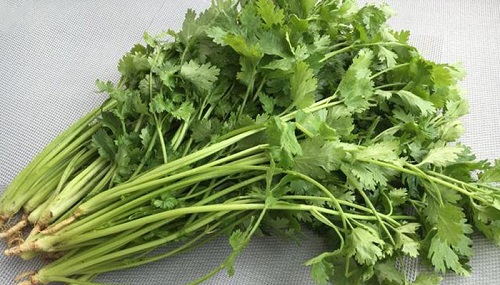
Chinese Parsley is also known as Xiang Cai, Hu Sui, Yan Sui, Mexican Parsley, Cilantro, or Coriander, which is an annual herb belonging to Umbelliferae. It is a common flavoring vegetable and dietary fiber supplement.
Chinese Parsley is native to the Mediterranean coast and Central Asia and is now found in many countries.
Archaeologists have found the seeds of Chinese Parsley in the grave of Tutankhamun, the ancient Egyptian pharaoh 3,300 years ago. This incident confirmed that Coriander has been planted at that time.
Chinese Parsley is documented in ancient Greek and Roman books. People at that time had found that it has the function of antisepsis and sterilization. The Romans used it for gastrointestinal upset.
Chinese Parsley is used in cuisines around the world and is a common ingredient in European sausage. Some cocktails and Thai coffee contain its extracts.
Around 400 AD, Chinese Parsley was introduced into China via the Silk Road. The book <Qimin Yaoshu> recorded how to plant Chinese Parsley.
In any season, people can gather Chinese Parsley, remove their impurities, clean them and use them directly or dry them in the sun, cut them, and make them into Chinese herbs.
Chinese Parsley contains many vitamins, minerals and volatile components. Generally, 7-10g of Chinese Parsley leaves can satisfy the human body¡¯s demand for vitamin C.
According to <Compendium of Materia Medica>, the medicinal property of Chinese Parsley is relatively warm, with a unique fragrance and pungent taste. It has a certain therapeutic effect on the pathological changes of the lung and stomach meridians.
About 1,500 years ago, Chinese Parsley was classified as Chinese herbal medicine. It is often used to treat wind-cold, indigestion, chronic gastritis, and hemorrhoids.
Anti-bacteria, anti-inflammation and anti-pathogen.
Promoting bone development and preventing osteoporosis.
Dilating blood vessels, softening blood vessels and increasing coronary blood flow.
Lowering blood pressure, blood lipids, and cholesterol, preventing atherosclerosis and cardiovascular disease.
Regulating female sex hormones, promoting ovulation, and treating infertility caused by ovulation disorders.
Stimulating sweat gland secretion, inducing eruptions, and releasing toxin.
Promoting saliva secretion, increasing appetite, and promoting gastrointestinal motility and digestion.
Warming the stomach, treating abdominal distension, abdominal pain, and indigestion caused by stomach cold or chronic gastritis.
Relieving toothache, low back pain, foot pain, hemorrhoids swelling and pain, treating blood in the stool and rectal prolapse.
Relieving neuroinflammation caused by a vitamin B1 deficiency, such as beriberi.
Relieving cheilitis, cheilitis, conjunctivitis and scrotal inflammation caused by a vitamin B2 deficiency.
Treating snake bites and poisoning caused by wild mushrooms.
Chinese Parsley with Ge Gen (Kudzu Root) can lower blood pressure.
Chinese Parsley with Sheng Jiang (Fresh Ginger) and Chen Pi (Tangerine Peel) can increase appetite and treat indigestion.
Chinese Parsley with Cong Bai (Scallion) and Zi Su Ye (Perilla Leaf) can treat fever, headache, and stuffy nose caused by wind-cold or influenza.
Chinese Parsley with wine can nourish the stomach and treat stomach pain and flatulence caused by stomach cold.
Chinese Parsley is an edible vegetable with almost no side effects. Excessive take of it may cause qi deficiency and vision loss.
The dosage of Chinese Parsley should be controlled at 5-15g.
It contains volatile oil, so it is not suitable for long-term decocting.
Its decoction can be used to fumigate and wash the affected part.
It should not be used to treat rashes caused by the syndrome of congestion and stagnation of heat toxins.
People with chronic skin diseases, eye diseases, or hyperhidrosis should not take it.
People with qi deficiency should not take it.
People with gastric or duodenal ulcers should not take it.
People who are experiencing skin rash should not take it.
Pregnant women should not take it.
